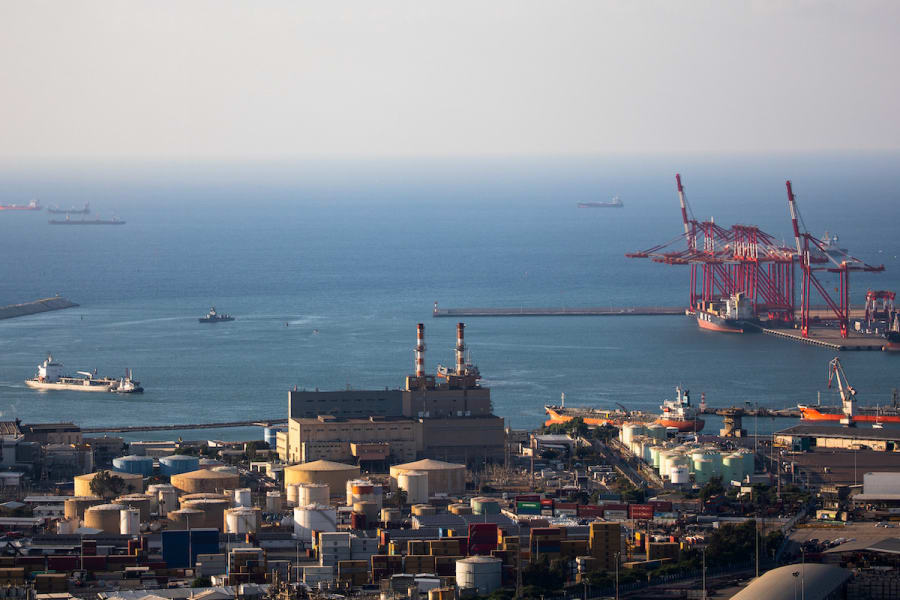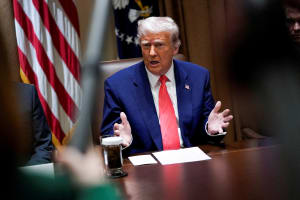Chinese, Indian ownership of Israeli ports makes international entities gatekeepers for 99% of Israel’s exports, imports
Washington has warned Israel against importing China’s influence, despite the Israel-China partnership’s promises of port automation and modernization

Two recent deals between the State of Israel and entities in India and China reflect a significant presence of foreign players moving in as Israel pursues groundbreaking decentralization and privatization in the country’s port industry.
Last month, India’s Adani Ports and SEZ Ltd. bought 70% of the Port of Haifa in northern Israel, which follows Israel’s inauguration last year of the Haifa Bayport, a private shipping port operated by China’s state-owned Shanghai International Port Group. The winning July bid for the Port of Haifa was split between Adani Ports and Israel’s Gadot chemical company for 4.1 billion shekels ($1.18 billion).
In Ashdod, in the south, Israel’s Hadarom Container Terminal, which began its operations last year, is run by Dutch company Terminal Investment Limited.
This trend in foreign ownership, after decades of centralized control, is also seen by some as an attempt to break the power of the port workers’ unions who were – and to a certain extent still are – among the most powerful and highest paid employees in Israel’s public sector. Port worker strikes have cost the state millions of dollars. One in particular – over steak meal coupons in 2011 – slowed down the counter for two months.
Israel is hoping that private ownership will lead to improvements in the import-export industry and increased revenue for Israelis.
“The privatization of the Port of Haifa will increase competition at the ports and lower the cost of living,” Israeli Finance Minister Avigdor Liberman said in July.
Prominent Middle East expert Guy Bechor wrote on his website Gplanet that, in addition to a large boost to the country’s income, the strategic partnership with India is the equivalent of “double revenue for Israel.”
Israel’s seaports handle 99% of its foreign trade of goods, according to Israeli business news website, Globes.
The road to private ownership of Israel’s ports began in 2005, when the government decided to break up the Israel Ports Authority, a body that had managed, developed and operated all three of Israel’s major international commercial ports – in Haifa, Ashdod and Eilat.
In its place, four government-owned companies were created – the Israel Ports Company, the Haifa Port Company, the Ashdod Port Company and the Eilat Port Company – and one privately owned port – the Haifa-based Israel Shipyards Port Ltd.
That a state-owned Chinese company operates a shipping port in Israel has caused concern for the United States, which sees it as creating a foothold in the region for the communist nation. The SIPG company, too, views the Haifa Port as part of China’s international Belt and Road Initiative – which has been dubbed the “New Silk Road.”
“According to [SIPG Vice President] Mr. Fang Huaijin, Haifa’s port is the hub of transportation and industries in northern Israel, a railroad junction along the Mediterranean coast, an important part of global shipping, as well as a vital pitch point related to the BRI [the Belt and Road Initiative],” the SIPG website states.
The ambitious infrastructure project seeks to connect Asia with Africa and Europe via land and maritime networks, to improve regional integration, to increase trade and to stimulate economic growth for China. Chinese President Xi Jinping launched the BRI in 2013 as his signature foreign-policy initiative, with more than 150 countries involved.
According to reports in Israel, U.S. President Joe Biden pressured Israel during his recent visit to the Middle East not to sell the Port of Haifa to a Chinese company. Bechor noted that American pressure against business dealings with China does carry sway on Jerusalem.
Israel has rejected bids by Chinese companies that have sought to build more lines of the Tel Aviv Light Rail, claiming that the offers were “too cheap.” Some of the first lines, however, were built by Chinese companies.
The Trump administration also urged Israel not to give China’s SIPG control over the Haifa Bayport, despite the Chinese company securing a tender with Israel’s Ministry of Transportation in 2015 to operate the terminal for 25 years, at the price of $1.7 billion.
The Chinese-operated port terminal is considered one of the most technologically sophisticated ports in the Mediterranean. The port is computerized and automated, with advanced cranes and a semi-autonomous loading system aided by artificial intelligence. The result of the automation efforts is ultra-low running costs in comparison with traditional ports, according to Project Cargo Journal.

Tal Heinrich is a senior correspondent for both ALL ISRAEL NEWS and ALL ARAB NEWS. She is currently based in New York City. Tal also provides reports and analysis for Israeli Hebrew media Channel 14 News.














